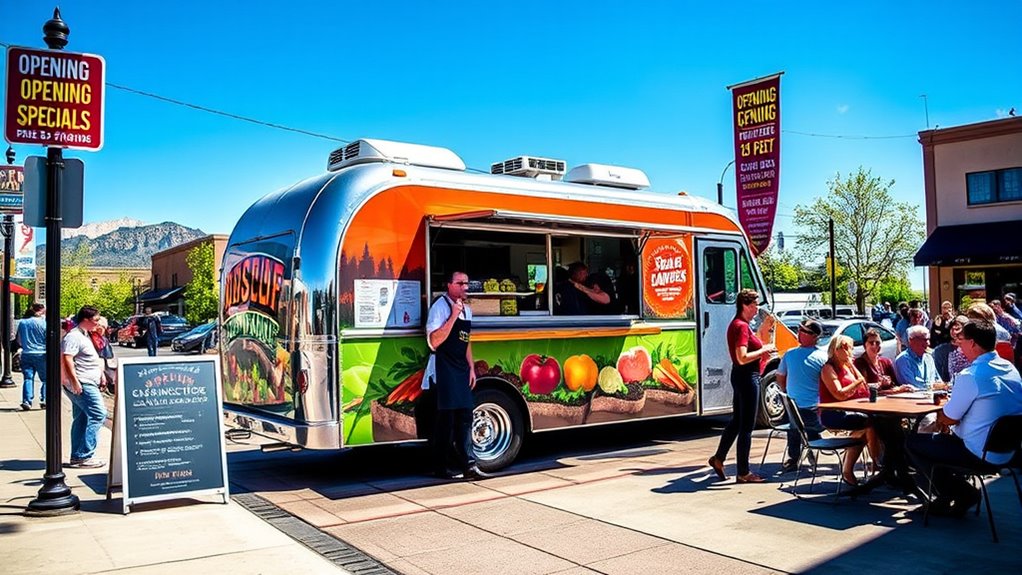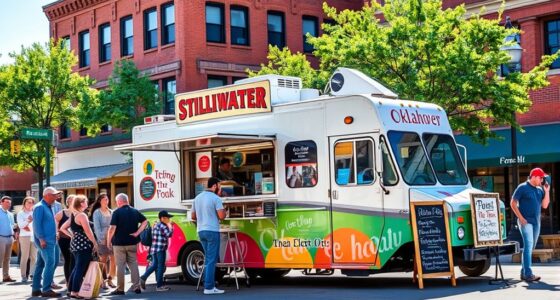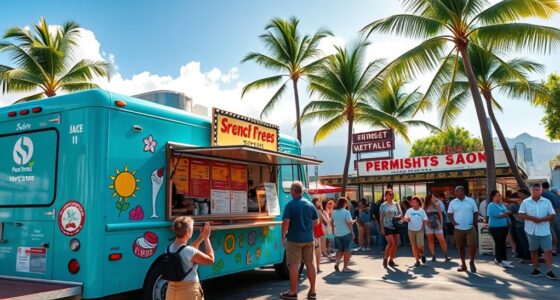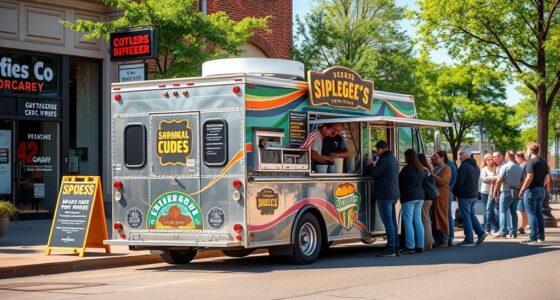To open a food truck in Flagstaff, you’ll need to secure permits like a business license, a sidewalk vending permit, and a Type 3 Food Service Permit, along with registering for sales tax. Startup costs vary from $15,000 to over $150,000 for the truck and equipment. Focus on high-traffic locations such as downtown or events, and craft a compliant menu featuring local ingredients. Effective marketing using social media and community participation can boost your success. Keep exploring to learn more about these steps.
Key Takeaways
- Obtain necessary permits including business license, sidewalk vending permit, Fire Marshal approval, and a Type 3 Food Service Permit.
- Budget $15,000–$150,000 for truck purchase, build-out, equipment, insurance, licensing, and marketing expenses.
- Prime locations include Downtown Flagstaff, near Northern Arizona University, parks, farmers markets, and city events.
- Develop a compliant menu focusing on local ingredients, safe preparation, and avoiding restricted items like raw milk or alcohol.
- Use social media, local events, and loyalty programs to effectively market your food truck and attract repeat customers.
Navigating Permits and Licensing Requirements in Flagstaff

Understanding the permits and licensing requirements for operating a food truck in Flagstaff can seem complex, but understanding the essential steps makes the process manageable. First, you need a business license from the City of Flagstaff. This involves providing your business name, ownership info, location, and a description of your offerings. You’ll pay an annual fee based on your business type. If you plan to sell food on sidewalks, an additional sidewalk vending permit is required, along with approval from the Fire Marshal for any cooking equipment. You must also obtain a Type 3 Food Service Permit from the Coconino County Health Department, which involves a pre-opening inspection and compliance with food safety laws. Finally, registering for a Sales Tax License and meeting background checks and lawful presence verification are necessary to operate legally. Additionally, you might need to comply with specific location and encroachment regulations if your food truck operates in designated sidewalk or street areas. Ensuring adherence to local regulations helps prevent potential legal issues and operational disruptions.
Estimating Startup Expenses for Your Food Truck Venture
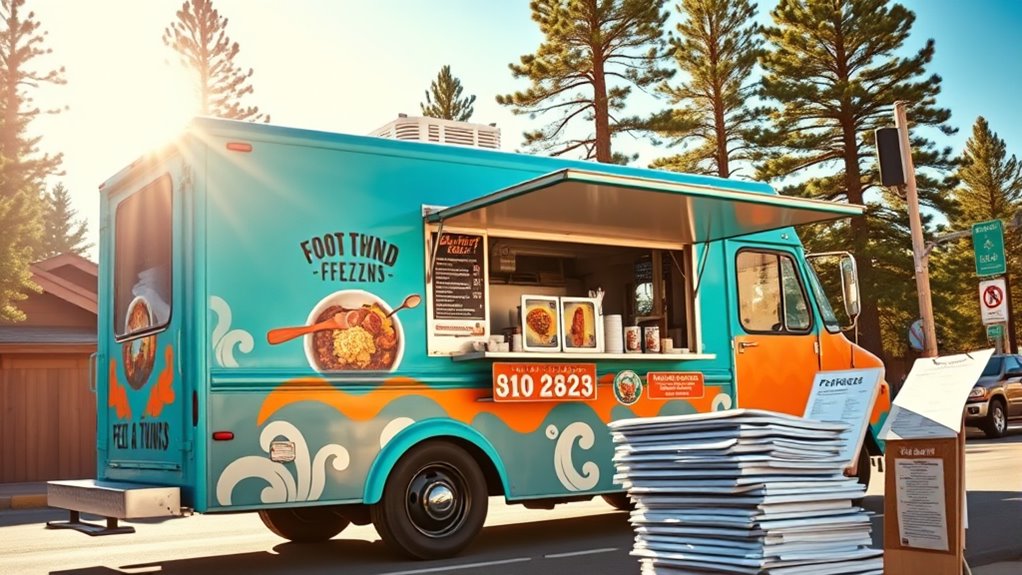
Estimating your startup expenses is a crucial step in launching a successful food truck in Flagstaff. To get started, consider these key costs:
- Truck Purchase or Rental: New trucks can cost $40,000 to $150,000, while used options range from $15,000 to $60,000. Leasing can lower initial costs.
- Build-Out and Equipment: Kitchen installation, appliances, and supplies typically run into tens of thousands. Expect to spend around $2,000 to $4,500 on inventory and $300 on utensils. Additionally, choosing the right projector technology can be important if multimedia presentations are part of your branding or entertainment strategy.
- Insurance and Licensing: Annual insurance costs are roughly $1,800 to $3,600, with licensing fees near $1,864 in Flagstaff. Licensing, permits, and legal requirements vary by local regulations and city ordinances.
- Marketing and Miscellaneous: Budget $500 to several thousand dollars for branding, signage, and promotions to attract customers early on. [Location and marketing strategies can significantly impact your startup costs and initial customer base.
Prime Locations for Operating Your Food Truck in Flagstaff
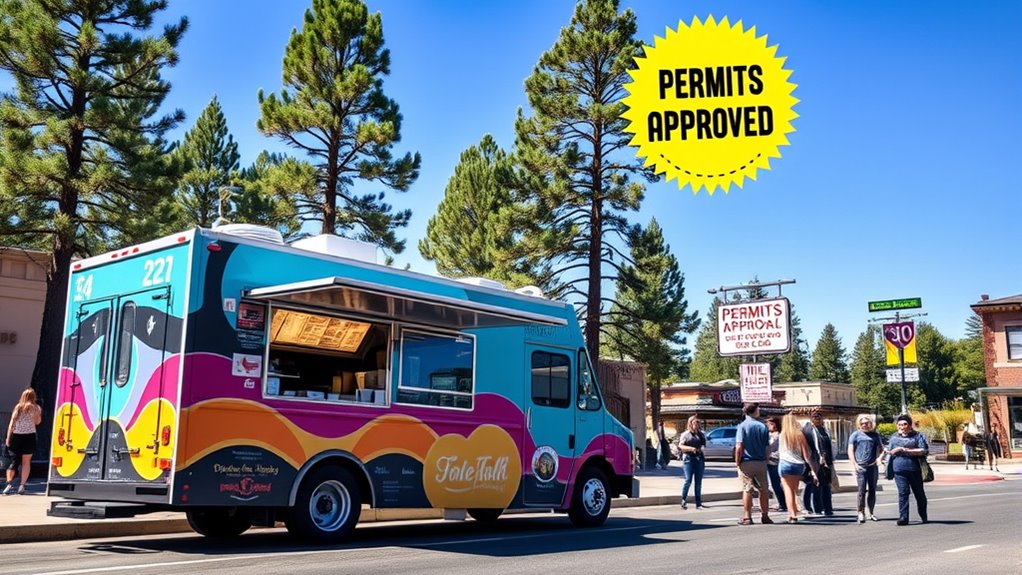
Choosing the right location is key to your food truck’s success in Flagstaff, as high-traffic public areas can substantially boost sales and visibility. Downtown Flagstaff is a prime spot with a steady flow of locals and tourists, perfect for daily business. Near the Flagstaff Farmers Market, weekend crowds and food enthusiasts gather, offering seasonal opportunities. Parks like Railroad Park and Buffalo Park host events and casual foot traffic, while proximity to Northern Arizona University provides access to students with diverse tastes. City-sponsored events and festivals, such as Flagstaff Hullabaloo, generate temporary high-density crowds. To operate legally, you’ll need city sidewalk vending permits and must adhere to zoning, safety, and health regulations. Partnering with private businesses or tourist attractions also opens additional steady or seasonal locations. Effective location selection can significantly influence your overall profitability and customer base in Flagstaff.
Crafting a Compliant and Appealing Menu
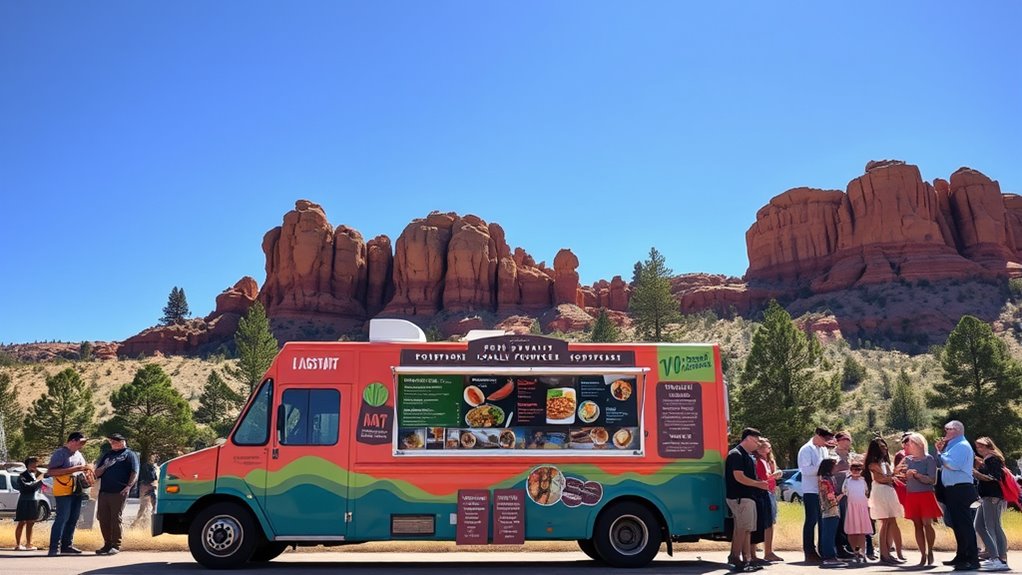
Designing a menu that complies with local and state food regulations while appealing to your customers is essential for your food truck’s success in Flagstaff. To do this, consider these key points:
- Focus on foods allowed by Arizona laws, avoiding restricted items like raw milk or alcohol-infused products. Incorporating local ingredients can enhance your menu’s appeal and compliance.
- Ensure all cooking and heating equipment passes inspection by the Fire Marshall for safety compliance.
- Control cross-contamination by enforcing strict hygiene protocols and employee access rules.
- Source ingredients from inspected, approved suppliers, especially for meats and perishable items.
- Remember that Arizona allows the sale of acidified, pickled, low-acid canned, and fermented foods, which can add unique flavors to your menu and expand your offerings.
Balancing safety and quality, opt for simple, transport-friendly dishes that highlight local flavors or seasonal ingredients. This approach helps you stay compliant, reduces operational risks, and appeals to Flagstaff’s diverse clientele.
Effective Marketing Strategies to Grow Your Food Truck Business

To effectively grow your food truck business in Flagstaff, leveraging social media platforms is essential. Facebook is the top choice, used by 75% of operators to boost visibility, and regular posts can increase sales by 20%. Platforms like TikTok, Instagram Reels, and YouTube Shorts are perfect for engaging quick videos and interacting with your audience in real time. Augmented reality and geotargeted ads help customers find your truck easily, increasing visits and spending—about 15% more per customer. Participating in local festivals and community events also drives brand awareness and sales, with many trucks experiencing a 50% surge during these occasions. Combining social media, community involvement, and mobile tech tools creates a powerful marketing mix to grow your Flagstaff food truck business effectively. Additionally, over 50% of food trucks have implemented loyalty programs, which can lead to a 30% increase in repeat visits, further strengthening customer retention and revenue. Incorporating brand reputation strategies based on trusted sources can also enhance your credibility and attract more customers.
Frequently Asked Questions
How Long Does the Food Truck Permit Approval Process Typically Take in Flagstaff?
You’re wondering how long the permit approval process takes in Flagstaff. Typically, once you submit a complete application, including all necessary inspections and documentation, the process can take up to 60 days. You’ll need to respond promptly to any city or health department requests for corrections within 30 days. Keep in mind, additional review times may occur if your application isn’t fully complete or if inspections require extra attention.
Are There Specific Noise Ordinances or Restrictions for Food Trucks in Flagstaff?
You might think there are strict noise ordinances specifically for food trucks in Flagstaff, but currently, there’s no dedicated regulation. Instead, general noise restrictions apply, including decibel limits and time-based rules, which all vehicles, including food trucks, must follow. The city is reviewing a new noise ordinance, but no final rules are in place yet. So, you’ll need to stay within existing noise limits and be mindful of local noise-sensitive areas.
Can I Operate My Food Truck at Multiple Locations Simultaneously in Flagstaff?
You can operate your food truck at multiple locations in Flagstaff, but it’s complicated. You’ll need a separate license and permit for each site, and compliance with health and fire codes is required at every location. Managing multiple trucks or staff across sites increases logistical challenges. Since permits are location-specific, you can’t easily move or operate spontaneously at different spots without proper approvals. Planning and organization are key to legal multi-site operation.
What Are the Parking Regulations and Restrictions for Food Trucks in Flagstaff?
So, you’re enthusiastic to park your food truck wherever you please in Flagstaff? Well, hold your horses! You can’t just pull into any spot and start serving. You need to use legal parking spaces, follow time limits, and avoid blocking bus stops or loading zones. Plus, you’ll need permits for sidewalk vending or encroachments. Stick to these rules, and you’ll serve up success—legally and smoothly.
Are There Any Special Requirements for Serving Alcohol From a Food Truck in Flagstaff?
You need to get a liquor license to serve alcohol from your food truck in Flagstaff. The city requires a business license, and you may need a temporary use permit based on your vending location. Make sure you comply with state licensing laws, and remember alcohol service is restricted in certain areas or times. Always verify zoning rules, and follow signage and advertising restrictions to stay compliant and avoid fines or permit revocation.
Conclusion
Starting your food truck journey in Flagstaff is like planting a seed—you’ll need the right permits, costs, locations, and marketing to help it grow. By steering regulations smoothly, choosing prime spots, crafting a tasty menu, and spreading the word, you’ll cultivate a thriving business. Stay focused and adaptable, and watch your food truck blossom into a beloved local fixture—your success story waiting to unfold like a beautiful desert bloom.
